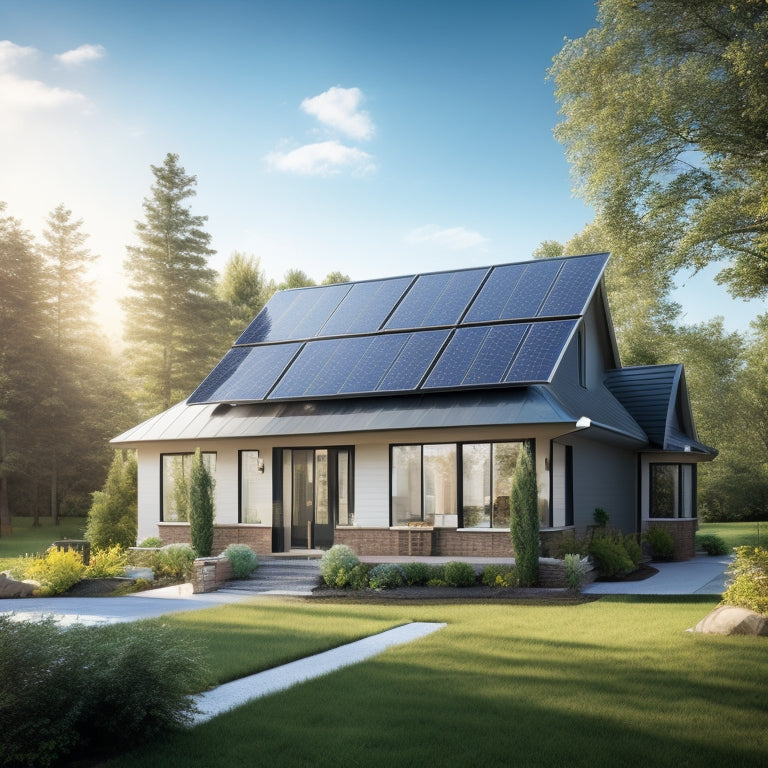
Boost Home Energy Efficiency With Solar Panels
Share
By integrating solar panels into your home's energy system, you can greatly reduce your reliance on the grid and cut your energy bills by leveraging the free and abundant energy from the sun. To maximize efficiency, assess your energy needs, evaluate your roof's suitability, and choose the right inverter and high-efficiency panels. Consider energy storage options and take advantage of incentives for homeowners. Proper installation and maintenance are essential, and monitoring your energy savings will help you optimize your system's performance. As you explore solar panels, you'll discover even more ways to boost your home's energy efficiency and reduce your carbon footprint.
Key Takeaways
• Conduct an energy audit to identify inefficiencies and optimize energy usage patterns for maximum solar panel benefits.
• Choose high-efficiency solar panels with durable design and construction to maximize energy production.
• Select an inverter that ensures grid connection compatibility, reliability, and durability for optimal energy conversion.
• Consider energy storage options like batteries to store excess energy and reduce reliance on the grid.
• Monitor your energy savings in real-time to identify energy-hungry appliances, reduce waste, and enhance overall performance.
Understanding Solar Panel Systems
You can think of a solar panel system as a collection of interconnected components designed to harness sunlight and convert it into electrical energy. This system integration is key to maximizing energy output.
One common misconception - a solar myth - is that solar panels require maintenance. In reality, they're designed to operate with minimal upkeep.
To guarantee peak performance, understanding how the components work together is crucial. The photovoltaic (PV) cells in the solar panels convert sunlight into direct current (DC) electricity. An inverter then converts the DC power into alternating current (AC) electricity, which is usable in your home.
The system also includes a mounting system, which secures the panels to your roof, and a monitoring system, which tracks energy production.
By grasping how these components integrate, you'll be better equipped to optimize your system's performance and reap the benefits of solar energy.
Determining Your Energy Needs
To determine your energy needs, you'll need to assess your current energy usage and identify areas where energy is being wasted. Start by reviewing your past utility bills to understand your energy consumption patterns.
Assess Current Energy Usage
Determining your energy needs begins with a thorough examination of your current energy usage patterns. Understanding how much energy you consume and when you consume it's essential in determining the right solar panel system for your home.
To assess your current energy usage, start by reviewing your past utility bills. This will give you an idea of your energy consumption patterns and help you identify areas of inefficiency.
-
Collect and analyze your utility bills for the past year to identify peak energy usage periods.
-
Conduct an energy audit to identify energy-intensive appliances and systems in your home.
-
Review your energy usage patterns to determine the best times to generate energy with solar panels.
Identify Energy Wasting Areas
Now that you've assessed your current energy usage patterns, it's time to pinpoint areas where energy is being wasted in your home. Conducting an energy audit is an effective way to identify these energy-wasting areas.
Start by inspecting your home's insulation, windows, and doors for air leaks. You can use a candle or incense stick to detect leaks. Turn off all the fans and HVAC systems, then hold the candle or incense stick near potential leak sites. If the flame flickers or the smoke wavers, you've found a leak. Don't forget to check for hidden leaks in your ductwork, as these can be significant energy wasters.
Next, inspect your lighting and appliances. Are you using energy-efficient LED bulbs? Are your appliances Energy Star certified? Look for opportunities to upgrade to more efficient models.
Assessing Your Roof's Suitability
You'll need to evaluate your roof's orientation, size, and condition to determine its suitability for solar panels. This assessment is important in guaranteeing that your solar panel system operates efficiently and effectively.
-
Roof Orientation: A south-facing roof with little to no shading is ideal for solar panels, as it receives the most direct sunlight. East- and west-facing roofs can also work, but may produce slightly less energy.
-
Roof Material: Solar panels can be installed on various roof materials, including asphalt shingles, metal, and clay tiles. However, some materials, like slate or cedar shakes, may require additional installation considerations.
-
Roof Age: Consider the age of your roof, as older roofs may require replacement before installing solar panels. It's important to ensure your roof is in good condition to avoid additional costs and maintenance down the line.
Choosing the Right Inverter
When selecting an inverter for your solar panel system, you'll need to contemplate the type of inverter that's right for you.
You'll have to choose between string inverters, microinverters, and power optimizers, each with their own strengths and weaknesses.
Inverter Types Compared
Your solar panel system's efficiency relies heavily on the type of inverter you choose, as it directly affects the conversion of DC power into usable AC power. The inverter is responsible for converting the DC power generated by your solar panels into AC power that can be used in your home.
With so many inverter options available, it's crucial to understand the differences between them to make an informed decision.
When selecting an inverter, you'll want to take into account the following factors:
-
Inverter Reliability: Look for inverters with a proven track record of reliability and durability. A dependable inverter ensures that your solar panel system operates efficiently and minimizes downtime.
-
Grid Connection: If you plan to connect your solar panel system to the grid, you'll need an inverter that meets the grid connection requirements. Ensure the inverter you choose is compatible with your local grid connection standards.
-
Inverter Compatibility: Verify that the inverter is compatible with your solar panel array's voltage and power output. This guarantees efficient energy production and minimizes energy loss.
Inverter Efficiency Ratings
As you navigate the inverter market, it's important to grasp inverter efficiency ratings, which typically range from 90% to 98%, to make sure you're getting the most out of your solar panel system. You want to maximize the energy output, and a high-efficiency inverter is key.
When evaluating inverter efficiency, consider metrics such as maximum power point tracking (MPPT) efficiency, DC-AC conversion efficiency, and European efficiency. These metrics provide a thorough picture of an inverter's performance.
When choosing an inverter, prioritize inverter durability alongside efficiency ratings. A durable inverter can withstand harsh environmental conditions, ensuring top performance over its lifespan.
Look for inverters with a high IP (Ingress Protection) rating, which indicates resistance to dust, water, and other environmental factors. Additionally, consider the warranty offered by the manufacturer, as it often reflects the inverter's expected lifespan.
Selecting High-Efficiency Panels
You'll get the most out of your solar panel system by choosing high-efficiency panels that convert a higher percentage of sunlight into electricity. High-efficiency panels are crucial for maximizing your energy output, especially if you have limited roof space.
When selecting panels, consider the following key factors:
-
Panel Durability: Look for panels with a durable design and construction to guarantee they can withstand various weather conditions and last for decades.
-
Energy Output: Choose panels with high energy output ratings to maximize your energy production.
-
Efficiency Ratings: Opt for panels with high efficiency ratings (measured in percentage) to convert more sunlight into electricity.
Optimizing Panel Placement
Once you've selected high-efficiency panels, proper placement is key to maximizing energy production, so it's important to assess your roof's architecture and surroundings to optimize panel placement.
To do this, conduct a Shading Analysis to identify areas where trees, buildings, or other obstructions might cast shadows on your roof. This analysis will help you pinpoint the sunniest spots, ensuring your panels receive maximum sunlight.
Next, prioritize Obstruction Minimization by evaluating potential obstacles, such as chimneys, vents, or skylights. Consider the direction your roof faces and the pitch of your roof, as these factors can impact panel performance.
By strategically positioning your panels, you can minimize energy losses and ensure ideal energy production. Remember, even small obstructions can significantly reduce energy output, so it's important to carefully plan your panel layout.
Considering Energy Storage Options
With your solar panel system in place, you're now prepared to explore energy storage options that'll allow you to maximize your energy independence and savings. Energy storage systems, such as batteries, enable you to store excess energy generated by your solar panels during the day for use during the night or on cloudy days. This means you'll be less reliant on the grid, reducing your energy bills and carbon footprint.
When considering energy storage options, there are several factors to keep in mind:
-
Battery Costs: The cost of batteries has decreased greatly over the years, making energy storage more accessible. However, the upfront cost is still a significant investment.
-
Grid Independence: With energy storage, you'll have the ability to power your home even when the grid is down, providing you with true energy independence.
-
System Sizing: It's crucial to size your energy storage system correctly to make sure you're storing enough energy to meet your needs.
Incentives for Homeowners
Moreover, substantially, As a homeowner, you can take advantage of various incentives that greatly reduce the upfront cost of solar panels and energy storage systems, making your switch to clean energy more affordable.
You're eligible for a 26% tax credit on the total cost of your solar panel system, including equipment and installation. Additionally, many utilities and local governments offer rebate programs that provide a one-time payment or credit on your utility bill.
You may also be eligible for government grants, which can provide significant financial support for your clean energy project. These financial perks can substantially reduce the upfront cost of going solar, making it more accessible to homeowners like you.
Moreover, installing solar panels can increase your home valuation, which can be a significant selling point if you decide to sell your home in the future. By taking advantage of these incentives, you can save money, reduce your carbon footprint, and increase the value of your home.
Installation and Maintenance Tips
When installing solar panels, you'll want to guarantee a seamless process and peak performance. To get the most out of your system, it's essential to take into account a few key factors during installation and maintenance.
Site Assessment Matters
You must consider several key factors during a site assessment to guarantee peak solar panel performance, including the orientation and slope of your roof, surrounding shading obstacles, and local building codes. A thorough site assessment is important to make sure your solar panel system operates at maximum efficiency.
When evaluating your property, keep in mind the following key considerations:
-
Property Boundaries: Make sure that your solar panel system doesn't encroach on neighboring properties, respecting local zoning laws and regulations.
-
Neighborhood Obstacles: Identify any potential shading obstacles, such as nearby trees, buildings, or other structures that could impact your solar panel system's performance.
-
Environmental Factors: Assess the local climate, wind patterns, and natural light exposure to optimize your solar panel system's design and installation.
Panel Orientation Counts
Perfectly orienting your solar panels can greatly enhance your system's energy output, with even small deviations from the best angle resulting in notable losses in efficiency. When it comes to maximizing energy production, angle matters.
The best angle for your solar panels depends on your location and the sun's path throughout the year. In the northern hemisphere, a south-facing orientation is generally preferred, as it allows your panels to capture the most sunlight throughout the day. However, if you live in an area with frequent shading or obstructions, you may need to adjust the angle to optimize energy production.
Consider consulting with a solar panel professional to determine the most suitable angle for your specific location and system design. By getting the angle right, you can ensure your solar panels operate at peak performance, providing you with the power you need to boost your home's energy efficiency.
Regular Cleaning Essential
Dust, dirt, and debris can greatly reduce your solar panels' energy output, making regular cleaning an essential part of maintaining their peak performance. You'll want to make sure your solar panels are free from obstructions to maximize their energy production. Dust accumulation can lead to a significant decrease in energy output, which is why cleaning your solar panels regularly is important.
Here are some tips to keep in mind when cleaning your solar panels:
- Avoid using harsh chemicals or abrasive materials that can damage the panels' surface.
- Use a soft-bristled brush or a specialized solar panel cleaning tool to remove debris.
- Clean your solar panels during the early morning or late afternoon to avoid water spots and minimize evaporation.
Regular cleaning not only boosts energy output but also helps maintain panel durability. By keeping your solar panels clean, you'll ensure top performance and extend their lifespan.
Monitoring Your Energy Savings
Track your energy production and consumption in real-time to optimize your solar panel system's performance and maximize your energy savings. With advanced monitoring systems, you can gain valuable insights into your energy usage patterns and identify areas for improvement. This data-driven approach enables you to make informed decisions about your energy consumption, reducing waste and optimizing your energy budget.
| Energy Tracking Benefits | Consumption Insights |
|---|---|
| Real-time monitoring | Identify energy-hungry appliances |
| Optimize energy production | Pinpoint energy waste |
| Maximize energy savings | Adjust consumption habits |
| Identify system issues | Enhance energy efficiency |
| Improve overall performance | Make data-driven decisions |
Frequently Asked Questions
Can I Install Solar Panels on a Rented Property?
"Did you know that 1 in 5 homeowners consider installing solar panels? If you're a renter, you can too, but you'll need to secure your landlord's permission, ensuring it's outlined in your rental agreements, to harness the power of solar energy."
Do I Need to Replace My Roof Before Installing Solar Panels?
Before installing solar panels, you should examine your roof to make sure it's structurally sound and won't compromise the system's performance; check the roof's age, material, and inspect for energy loss to determine if replacement is necessary.
Can I Use Solar Panels to Charge My Electric Vehicle?
'You're planning to charge your electric vehicle with solar power, a smart move! With vehicle integration, you can harness excess energy for your car, and energy storage systems guarantee a seamless charging experience, amplifying your eco-friendly lifestyle.'
Will Solar Panels Increase My Property's Resale Value?
You'll likely see a significant increase in your property value, as solar panels are a sought-after feature in the real estate market, making your home more attractive to potential buyers and boosting its resale value.
Can I Install Solar Panels on a North-Facing Roof?
You're wondering if a north-facing roof is suitable for solar panels. Think of it like a photographer seeking the perfect light: a north-facing roof receives indirect sunlight, reducing energy output.
Related Posts
-

Charge Your Ride With Renewable Energy Solutions
By immersing yourself in renewable energy sources like solar power, you can greatly diminish your carbon footprint an...
-

What Are the Best Green Vehicle Product Platforms?
You're in the market for eco-friendly vehicles and wondering which platforms cater to your sustainable lifestyle. Top...
-

Why Recharge Your Car Battery With DIY Power?
By switching to DIY solar power, you can drastically reduce your reliance on expensive battery services, lower your c...


